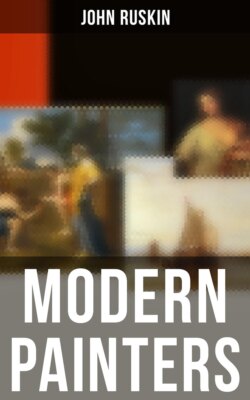Читать книгу Modern Painters - John Ruskin - Страница 16
На сайте Литреса книга снята с продажи.
CHAPTER VI.
OF IDEAS OF BEAUTY.
ОглавлениеTable of Contents
Any material object which can give us pleasure in the simple contemplation of its outward qualities without any direct and definite exertion of the intellect, I call in some way, or in § 1. Definition of the term "beautiful."some degree, beautiful. Why we receive pleasure from some forms and colors, and not from others, is no more to be asked or answered than why we like sugar and dislike wormwood. The utmost subtilty of investigation will only lead us to ultimate instincts and principles of human nature, for which no farther reason can be given than the simple will of the Deity that we should be so created. We may, indeed, perceive, as far as we are acquainted with His nature, that we have been so constructed as, when in a healthy and cultivated state of mind, to derive pleasure from whatever things are illustrative of that nature; but we do not receive pleasure from them because they are illustrative of it, nor from any perception that they are illustrative of it, but instinctively and necessarily, as we derive sensual pleasure from the scent of a rose. On these primary principles of our nature, education and accident operate to an unlimited extent; they may be cultivated or checked, directed or diverted, gifted by right guidance with the most acute and faultless sense, or subjected by neglect to every phase of error and disease. He who has followed up these natural laws of aversion and desire, rendering them more and more authoritative by constant obedience, so as to derive pleasure always from that which God originally intended should give him pleasure, and who derives the greatest possible sum of pleasure from any given object, is a man of taste.
§ 2. Definition of the term "taste."
This, then, is the real meaning of this disputed word. Perfect taste is the faculty of receiving the greatest possible pleasure from those material sources which are attractive to our moral nature in its purity and perfection. He who receives little pleasure from these sources, wants taste; he who receives pleasure from any other sources, has false or bad taste.
§ 3. Distinction between taste and judgment.
And it is thus that the term "taste" is to be distinguished from that of "judgment," with which it is constantly confounded. Judgment is a general term, expressing definite action of the intellect, and applicable to every kind of subject which can be submitted to it. There may be judgment of congruity, judgment of truth, judgment of justice, and judgment of difficulty and excellence. But all these exertions of the intellect are totally distinct from taste, properly so called, which is the instinctive and instant preferring of one material object to another without any obvious reason, except that it is proper to human nature in its perfection so to do.
§ 4. How far beauty may become intellectual.
Observe, however, I do not mean by excluding direct exertion of the intellect from ideas of beauty, to assert that beauty has no effect upon nor connection with the intellect. All our moral feelings are so in-woven with our intellectual powers, that we cannot affect the one without in some degree addressing the other; and in all high ideas of beauty, it is more than probable that much of the pleasure depends on delicate and untraceable perceptions of fitness, propriety, and relation, which are purely intellectual, and through which we arrive at our noblest ideas of what is commonly and rightly called "intellectual beauty." But there is yet no immediate exertion of the intellect; that is to say, if a person receiving even the noblest ideas of simple beauty be asked why he likes the object exciting them, he will not be able to give any distinct reason, nor to trace in his mind any formed thought, to which he can appeal as a source of pleasure. He will say that the thing gratifies, fills, hallows, exalts his mind, but he will not be able to say why, or how. If he can, and if he can show that he perceives in the object any expression of distinct thought, he has received more than an idea of beauty—it is an idea of relation.
Ideas of beauty are among the noblest which can be presented to the human mind, invariably exalting and purifying it according to their degree; and it would appear that we are intended § 5. The high rank and function of ideas of beauty.by the Deity to be constantly under their influence, because there is not one single object in nature which is not capable of conveying them, and which, to the rightly perceiving mind, does not present an incalculably greater number of beautiful than of deformed parts; there being in fact scarcely anything, in pure, undiseased nature, like positive deformity, but only degrees of beauty, or such slight and rare points of permitted contrast as may render all around them more valuable by their opposition, spots of blackness in creation, to make its colors felt.
§ 6. Meaning of the term "ideal beauty."
But although everything in nature is more or less beautiful, every species of object has its own kind and degree of beauty; some being in their own nature more beautiful than others, and few, if any, individuals possessing the utmost degree of beauty of which the species is capable. This utmost degree of specific beauty, necessarily coexistent with the utmost perfection of the object in other respects, is the ideal of the object.
Ideas of beauty, then, be it remembered, are the subjects of moral, but not of intellectual perception. By the investigation of them we shall be led to the knowledge of the ideal subjects of art.
